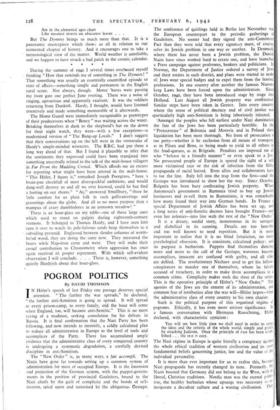During the summer of 1940 I several times overheard myself
thinking "How that reminds me of something in The Dynasts! "
That something was usually an essentially countrified episode or state of affairs—something simple and permanent in the English rural scene. Not always, though. Motor 'buses were passing my front gate one perfect June evening. There was a noise of singing, uproarious and apparently exultant. It was the soldiers returning from Dunkirk. Hardy, I thought, would have listened attentively and made something memorable of it afterwards.
The Home Guard were immediately recognisable as prototypes of their predecessors when " I3oney " was waiting across the water. Betaking themselves at dusk to the shepherd's but on the down for their night watch, they were—with a few exceptions—a modernised version of " The Bang-up Locals." I don't suggest that their conversations up on the hill were in the vernacular of Hardy's simple-minded wiseacres. The B.B.C. had put them a long way ahead of that. But I found it plausible to infer that the sentiments they expressed could have been tranated into something ancestrally related to the talk of the malt-house villagers in Far From the Madding. Crowd. Which affords me an excuse for reporting what might have been uttered in the malt-house. " This Hitler, I figure it," remarked Joseph Poorgrass, " have a brain-pan chockfull of most disrespeckful ambitions, and would dang-well destroy us and all we ever knowed, could he but find a footing on our shores." " Ay," answered Smallbury, " there be little comfort for us plain folk in such gallivanterings and goosetings about the globe. And all to no more purpose than a mampus of crazy dumbledores in an unmown meadow! " •
There is an hour-glass on my table----one of those large ones which used to stand on pulpits during eighteenth-century sermons. It belonged to Thomas Hardy, and I have seen him turn it over to watch its pale-fulvous sands heap themselves to a subsiding pyramid. Englassed between slender columns of worm- holed wood, they are doing the same now. They measured the hours while Napoleon came and went. They will make their casual contribution to Chronometry when aggression has once again received itk proper repayment. With which self-evident observation I will conclude. . . . There is, however, something quietly Hardyish about that hour-glass.


























 Previous page
Previous page